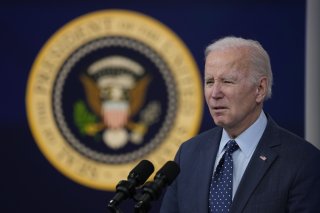An Indo-Pacific Economic Framework—Minus Economics
The Biden administration’s attempt to shore up influence in the Indo-Pacific rings hollow without a trade pillar to IPEF.
When President Joe Biden launched the Indo-Pacific Economic Framework (IPEF) in May 2022, he declared that the agreement would write “new rules for the 21st century economy.” Modeled on four pillars—trade, supply chains, clean energy, and tackling corruption—the IPEF is the administration’s response to growing Chinese influence in the region and a desire to shore up U.S. presence among key Indo-Pacific partners. However, at a summit this month, IPEF countries failed to conclude an agreement on the trade pillar, leaving the framework with no substantive economic component. Making matters worse, of the thirteen countries negotiating with the United States, only three have an existing trade agreement—Australia, Singapore, and South Korea. This means the collapse of the trade pillar of IPEF is a missed opportunity to deepen economic links in the Indo-Pacific and undercuts U.S. efforts to develop a new architecture for engagement in the region.
The administration did point to the three other pillars of IPEF as achievements. Secretary of Commerce Gina Raimondo finalized the two pillars focused on financing for the green transition and commitments to combat corruption. The third, the supply chain pillar, was concluded in May and established new rules to help governments respond to supply chain disruptions.
However, these three pillars were not foundational for IPEF—climate change financing, while a welcome bonus for IPEF countries like India and the Philippines, neither brings the United States economic benefits nor draws partners closer in trade ties. The commitment to combat corruption only reinforces existing obligations under the UN Convention against Corruption (UNCAC) and Organisation for Economic Co-operation and Development (OECD) anti-corruption norms.
As for supply chains, while that pillar is the most promising, it is also short on details about the role of the private sector, surely a necessary player in facilitating resilient supply chains. Moreover, building supply chain resilience requires robust trading relationships with the institutional infrastructure that supports collaboration, people-to-people ties, and information exchange. While IPEF countries account for 21 and 17 percent of U.S. goods and services trade, respectively, there remains ample room to expand, particularly with critical strategic partners such as India, Indonesia, and Vietnam.
When IPEF was first announced, some dismissed it as a “nothing-burger,” complaining that IPEF lacked teeth—it was not a rules-based economic framework with the legal clout of a trade agreement. Significantly, it would not provide signatories access to U.S. markets. However, many held out hope that IPEF was laying the groundwork for a transformational Indo-Pacific institution that could eventually expand to offer new norms of economic engagement in addition to its other pillars.
This is because underpinning the enormous potential of IPEF were two important facts. First, the United States pulled out of the Trans-Pacific Partnership (TPP) in 2017, an agreement that would have advanced U.S. strategic interests in the Indo-Pacific by bolstering its alliances and boosting U.S. leadership in the region. Second, the United States has no meaningful alternative to China’s Belt and Road Initiative. If offering vast amounts of financing for infrastructure development as a counter to Beijing was not viable U.S. policy, it was clear that Washington needed to offer an alternative. A new international order isn’t built in a day, and IPEF seemed to be the first small step to drawing partner countries together in a loose economic framework. The fact that the United States was able to cajole India (notoriously recalcitrant on international trade frameworks) as well as Thailand (whose business and media community have been the target of a concerted Chinese influence campaign) to join was promising.
It is clear from the Biden administration’s initial announcements about IPEF that they understood these needs. National Security Advisor Jake Sullivan stated that while “this framework is intentionally designed not to be a ‘same old, same old’ traditional trade agreement,” IPEF would bring “shape and coherence to the economic pillar of our Indo-Pacific strategy.” In that same briefing, U.S. Trade Representative Katherine Tai also stated that the trade pillar “will unlock enormous economic value.”
But the administration seems to have changed its mind. After the release of the IPEF joint statement, Raimondo made a surprising statement to reporters, saying that IPEF “is not and was never conceived to be a trade agreement. It is an economic initiative that will establish mechanisms and a framework, an economic framework for how we engage on economic issues and work together to address these really important issues.” With the trade pillar now missing, it is safe to conclude that its enormous economic value has equally vanished. Without an economic pillar, it is hard to see why IPEF countries would stay committed to this framework in the long run or what alternative economic leadership the United States can offer in the Indo-Pacific.
Dr. Inu Manak is a fellow for trade policy at the Council on Foreign Relations (CFR). Dr. Manak’s research focuses on U.S. trade policy and the law and politics of the World Trade Organization. Her recent book, The Development Dimension: Special and Differential Treatment in Trade (Routledge Focus, 2021), was co-authored with James Bacchus, the first chairman of the World Trade Organization’s Appellate Body.
Dr. Manjari Chatterjee Miller is senior fellow for India, Pakistan, and South Asia at the Council on Foreign Relations (CFR) and a tenured Associate Professor of International Relations at Boston University. She is the author of Why Nations Rise: Narratives and the Path to Great Power (2021, shortlisted for the 2022 Hedley Bull Prize in International Relations) and Wronged by Empire: Post-Imperial Ideology and Foreign Policy in India and China (2013). Miller is also the co-editor of the Routledge Handbook of China-India Relations (2020), a monthly columnist for the Hindustan Times, and a frequent contributor to policy and media outlets.
Image: Shutterstock.com

